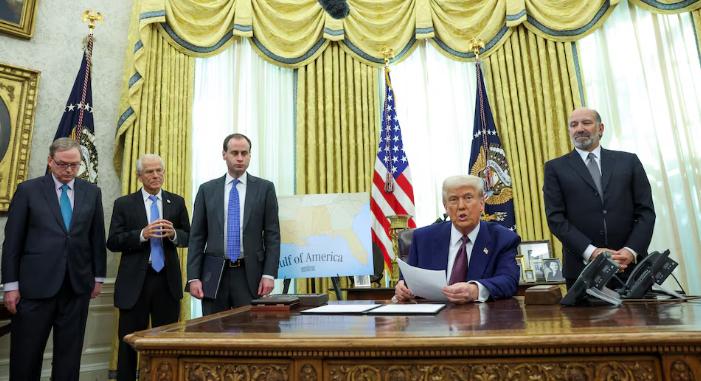
On February 14, 2025, US President Trump once again pushed global trade to the forefront and announced the implementation of a reciprocal tariff plan. This policy initiative has undoubtedly injected new uncertainty into the global economy. The Trump administration's move aims to reshape the global competitiveness of the US economy through trade policy adjustments and achieve its strategic goal of "making America great again". However, the impact of this policy on the global economy, especially supply chains and inflation, has become the focus of attention of all parties.
The background of Trump's proposal of the reciprocal tariff plan is complex. On the one hand, after several years of recovery, the US economy still faces challenges such as the return of manufacturing and supply chain restructuring. Trump believes that by imposing reciprocal tariffs, it can effectively protect US domestic industries, promote the return of manufacturing, and increase employment opportunities. However, the actual effect of this policy is full of variables. Samuel Tombs, chief US economist at the Pantheon Macroeconomics Institute, pointed out that manufacturers will be reluctant to increase investment and expand production capacity in the case of unclear policy situations, fearing that the cost pressure brought by high tariffs will weaken their market competitiveness.
Trump's reciprocal tariff plan is undoubtedly a major blow to the global supply chain. The implementation of high tariffs will lead to the re-arrangement of the global supply chain. In order to avoid tariff costs, companies may transfer production lines from high-tariff countries to low-tariff or zero-tariff countries. This reconfiguration of the supply chain is not only time-consuming and labor-intensive, but may also lead to a decline in production efficiency and an increase in costs. Luis de Guindos, vice president of the European Central Bank, said that the implementation of tariffs will cause a "supply shock", which will "fundamentally" affect global economic growth.
In terms of inflation, Trump's tariff policy also brings uncertainty. Federal Reserve Chairman Jerome Powell hinted that the interest rate cuts next year may be reduced to cope with potential inflationary pressures due to the inability to accurately predict the actual impact of tariffs. Some economists believe that high tariffs will directly push up domestic consumer prices in the United States, weaken consumer purchasing power, and thus have a negative impact on economic activities. However, de Guindos pointed out that if economic activity declines due to high tariffs, inflationary pressures may be alleviated.
Trump's policy combination of tax cuts, balance sheet reduction and interest rate hikes is aimed at creating a good business environment for the recovery of the US economy. Data from 2017 showed that this policy combination has promoted the growth of the US macroeconomy to a certain extent, with a decline in unemployment and a rebound in manufacturing. However, the global economy, especially emerging market countries, may be impacted by the US trade protectionism policy. A report from the Institute of World Economics of the Shanghai Academy of Social Sciences pointed out that although Trump's new policy has brought negative impacts to some economies, the risk tolerance of emerging markets to the US monetary tightening policy has increased, and the overall impact is expected to be limited.
Faced with Trump's reciprocal tariff plan, governments and companies need to respond cautiously. De Guindos suggested that Europe needs to be cautious in dealing with possible trade tariffs imposed by the United States, and pointed out that sometimes the initial announcement will not be realized in the end. Therefore, countries need to adopt flexible response strategies, seek solutions to trade issues through multilateral cooperation and negotiations, and avoid the escalation of trade wars to bring greater uncertainty to the global economy.
Trump's reciprocal tariff plan for 2025 once again focuses the focus of the global economy on trade policy. Although the actual effect and impact of the policy still need time to verify, the uncertainty it brings has already emerged. Governments and companies need to plan ahead and respond actively to ensure stability and development in the global economic fluctuations.

报告显示,中国电力投资加速增长,预计2024年电网基建投资将超过5300亿元。
近日,市场迎来了一则引人注目的消息:工业巨头3M公司(MMM.N)在本周五公布了其季度业绩报告,随后股价飙升至近两年来的
最近,外媒给OpenAI算了笔账,今年可能要血亏50亿美元。
近日,巴黎奥运会和世界铁人三项协会联合发布了一项重大决定,宣布因塞纳河水质污染问题,原定于近期进行的奥运会铁人三项首次下
当地时间7月18日,法国巴黎发生了一起令人震惊的持刀袭警事件。
近期,一则重大消息在国际舞台上引起轩然大波,马来西亚宣布加入金砖国家。
调查发现,互联网和智能手机的使用干扰了韩国近五分之一学生的生活。